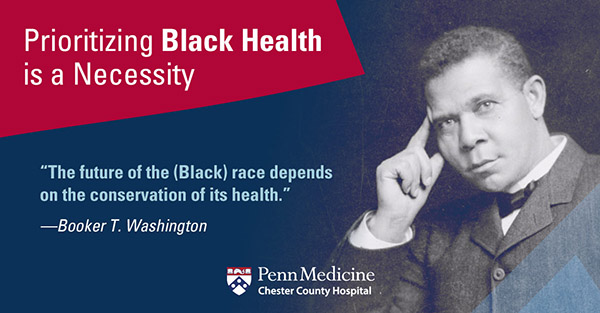
February is Black History Month -- a time for celebration of Black achievement, but also a time for reflection. As we look back to the state of society more than a century ago, when Booker T. Washington was fighting for better living conditions and better health for Black Americans, we can see that some of the problems of yesterday remain.
Booker T. Washington was a Black educator, author, speaker, and the founder of Tuskegee Institute — the first higher learning institution for Black people. He is an important figure within Black history and a key voice for trade school education.
He went on to study the connection between poverty and the poor health status and high death rates that the Black community in the rural South faced in the early 1900s. In 1915, he launched National Health Improvement Week, later known as National Negro Health Week (NNHW).
NNHW encouraged Black Americans to take control of their health and lasted nearly 40 years, helping to play a role in the increase of Black women entering nursing in the earlier half of the 20th century.
More than 100 years after Booker T. Washington founded NNHW, the Black community still suffers from poor health status and higher death rates when compared to other races. In fact, some statistics show that Black women are 40% more likely than white women to die from breast cancer. Additionally, Black people have the highest death rate from colorectal cancer compared to other races, and they experience the highest rate of heart disease.

Black Health Disparities and the Road Ahead
When thinking about building this healthier future for the Black community, it's important to take a look at our current state to better understand the challenges this community is facing when it comes to their health status and overall access to care -- a key problem for Black patients.
Black Americans tend to have lower access to health care services, including a regular primary care provider. They're also more likely to live in areas with shortages of primary care physicians, surgeons, and mental health professionals. And with less access to quality health options, Black Americans are less likely to get the care they need to help prevent and treat certain conditions.
Additionally, Black Americans may be less likely to trust healthcare professionals, as they learn facts like these: Black women are three times more likely to die from a pregnancy-related cause than white women. Black men are two times more likely to die from prostate cancer than white men.
These issues are problematic, but addressing them is by no means impossible to achieve. While much of the work would require larger changes in society, here are a few simple ways to take charge of your health:
- Seek affordable healthcare options: Hospital social workers are trained to help you access affordable healthcare options, including cheaper medication. Additionally, you can educate yourself on specific health-related questions, details on disability benefits, healthy food options, and access other helpful resources by visiting our Community Resources page.
- Get regular check-ups: Monthly self-exams and regular check-ups can help minimize risks for health conditions like cancer and can address health issues early before they lead to larger problems. Preventative care can also help you avoid conditions like diabetes, heart-related problems, and more. Prioritize checking in with your provider regularly.
- Improve personal habits: The places where we live, work, and socialize can have significant effects on individual and community health outcomes. While addressing the issue of access to healthier food options would require federal policy changes, there are small steps that individuals can take at home to help minimize health problems. Incorporating a healthy diet, managing stress, not smoking, making time for exercising, limiting alcohol, and keeping a clean home can lessen the likelihood of experiencing conditions ranging from depression and anxiety to heart disease and diabetes.
As we celebrate Black History Month this month and all year long, we can all do our part to continue Booker T. Washington's legacy by working together to build better, healthier futures for the Black community.
Take Action!
Feeling your best while living with heart failure means following a healthy lifestyle, including a low salt diet, taking multiple medications, self-monitoring for symptoms, and knowing when to call your doctor. This can be challenging, especially if you have other health problems. Join us to learn more about managing heart failure, ask questions, and get helpful tips and free giveaways from our team during the Coatesville Heart Failure Program on Thursday, February 29, 2024, 2:30 – 3:30pm at The Health Equity Center, 744 East Lincoln Highway, 4th Floor, Coatesville, PA 19320. This is a 3-Week Series occurring on consecutive Thursdays. Learn More! >>